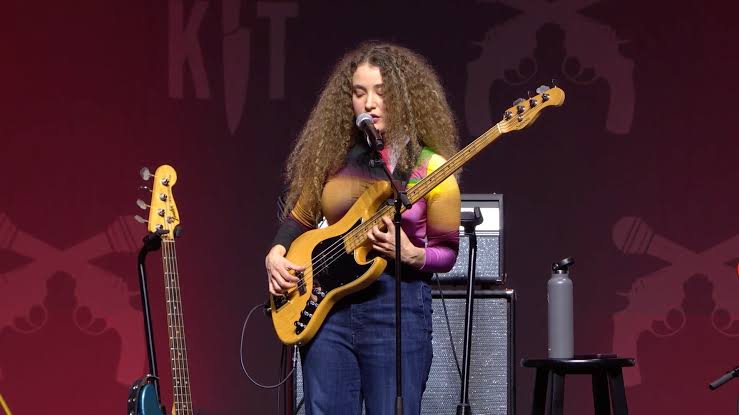If My Song Put a Smile on Your Face, Can I Get a Hello and a Check-In?
The Quiet Rise of Eliah James and the Making of “Letters to the Unknown”
He never planned to be famous. He barely planned to be heard.
Eliah James, a 27-year-old singer-songwriter from a quiet Georgia town no one can quite find on a map, uploaded a video on a rainy Wednesday night that changed his life. It was just him, a beat-up acoustic guitar, and a lyric scrawled on a coffee-stained notebook page:
**“If my song has put a smile on your face, can I get a hello and a check-in?”**
That line—simple, human, almost shy—lit a fire across social media. A fragment of melody turned into a movement. Overnight, his inbox filled with hundreds of messages from strangers around the world: soldiers overseas, nurses on night shifts, teenagers in bedrooms battling the weight of the world.
“It wasn’t even supposed to be a full song,” Eliah said in an interview with *The Indie Frequency*. “It was more like a thought. Something I wished someone had said to me once.”
Now, a year later, Eliah’s debut album, *“Letters to the Unknown,”* is being hailed as one of the most quietly powerful records of the decade. Written almost entirely during midnight hours in the corner of a shared apartment, the album plays like a series of audio postcards—intimate, raw, full of questions with no easy answers.
But it all started with that one lyric.
—
Eliah grew up in silence more than sound. His mother was a waitress who worked doubles, his father a mechanic who didn’t say much. Music became his language of choice. “We didn’t really do emotions out loud,” he said. “But when I picked up a guitar, it felt like someone was finally listening—even if it was just the walls.”
He never chased viral fame. In fact, he actively avoided attention, playing mostly open mics and uploading demos to his 236 YouTube subscribers. But “Smile,” as the fans now call it, changed everything.
In the video, he sits on the edge of a futon, one lamp lit behind him. He plays a soft, finger-picked pattern. His voice cracks slightly—deliberate or not, it feels real. Then the chorus hits:
**”If my song has put a smile on your face / Can I get a hello and a check-in today? / You don’t have to say much, I’ll just know that you’re okay / That’s enough for me, anyway.”**
That’s when the comments started. Thousands of them.
> *“I listened to this while driving home from the hospital after my mom passed. It gave me peace.”*
> *“This line made me text my brother. We hadn’t spoken in 3 years.”*
> *“This saved me tonight. Thank you.”*
—
The flood of support caught Eliah off guard.
He was still working part-time at a bookstore, shelving novels while his phone buzzed in his pocket nonstop. A week later, he was invited to perform on a late-night talk show. He almost turned it down. “I didn’t think I had anything to say,” he admitted. “But then I thought, maybe someone out there needs to hear it.”
He performed “Smile” with the same vulnerability it was born from—no backing track, no lights, just a spotlight and silence. The host was speechless. The audience stood. The internet lost its mind.
—
*“Letters to the Unknown”* was built from that momentum, but not rushed. Eliah took his time. Over nine months, he wrote and recorded in his bedroom-turned-studio, producing with his longtime friend Clara Nguyen, a sound engineer who described the process as “therapy set to chords.”
The album is 11 tracks long. No song breaks the 4-minute mark. There are no dance beats, no guest rappers, no glossy hooks. Just stories. Confessions. Memories etched in sound.
**“October Window”** talks about grief without using the word once. **“Grace at 3AM”** was inspired by a voicemail Eliah never got to return. And **“Chords in C Minor”** is an instrumental, the only one on the record, but fans say it somehow speaks volumes.
But it’s the final track, *“Hello and a Check-In,”* that ties everything together.
In it, Eliah sings not to a lover or a friend, but to the faceless listeners who kept him afloat during his darkest days:
**“You were voices in the silence / Warmth I didn’t know I needed / Strangers, yes—but angels, maybe / So I wrote this down and called it breathing.”**
—
When the album dropped, it didn’t break Spotify records or top Billboard charts. But it found its way into coffee shop speakers, therapy offices, rainy car rides, and late-night headphone sessions. It became one of those albums people discover when they need it most.
“There’s no marketing plan for healing,” Clara said. “This wasn’t designed to go viral. It was designed to feel human.”
Fans began writing letters back. Literal letters. Thousands of them, mailed to a P.O. box Eliah had included in the liner notes. Some were scribbled on notebook paper, others carefully typed, sealed with pressed flowers or polaroids. Each one addressed: *To Eliah, from someone who needed that song.*
Eliah reads them all. “I cry about twice a week,” he admits. “But it’s good. It means it matters.”
—
Now, on the cusp of his first tour—aptly titled *The Hello Tour*—Eliah isn’t trying to be a star. He just wants to play small rooms, see real faces, and maybe hear someone whisper “thank you” at the merch table.
“I don’t need arenas,” he says. “I just want to know someone’s okay.”
Because sometimes, that’s enough.
